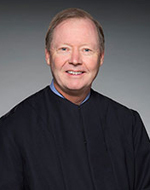


Soles Lecture to focus on school desegregation
Photos by iStock and courtesy of Delaware Supreme Court September 01, 2021
Delaware Chief Justice Collins Seitz to discuss landmark case in the state and the nation
In its landmark Brown v. Board of Education decision in 1954, ruling that racially segregated public schools were unconstitutional, the U.S. Supreme Court reviewed lower court decisions in five communities, including New Castle County, Delaware, that had been combined in the Brown case.
In four of those communities, judges had upheld the idea that “separate but equal” schools for Black and white children were permissible. But in the Delaware case, Chancellor Collins J. Seitz in the Court of Chancery had ruled otherwise.
"The cold hard fact is that the state in this situation discriminates against Negro children," he wrote in his historic 1952 decision. His work was quoted repeatedly by the Supreme Court when it ruled unanimously two years later in Brown.
When Judge Seitz died in 1998, newspapers across the nation remembered him for his principled stand, some calling him the state’s greatest jurist and the only judge in the federal desegregation case “who got it right.”
In explaining his role in the Brown case, the New York Times wrote: “Alone among the consolidated suits, Judge Seitz's decision directly confronted the doctrine underlying racial segregation in the schools, an issue the other judges had approached more circumspectly.”
Taking on racial segregation in 1952 was nothing new to Judge Seitz, a Wilmington native and 1937 University of Delaware graduate, who two years earlier had ordered UD to admit African American students for the first time. As in the later case, he found that the segregated schools open to Black students were inferior to those for whites.
Now, an audience will be able to hear the judge’s son, Delaware Chief Justice Collins J. Seitz Jr., discuss some of that history of desegregation in the state, the Brown case and his father’s groundbreaking decisions, in the 2021 James R. Soles Lecture on the Constitution and Citizenship.

Beginning at 3:30 p.m., Friday, Sept. 17, Seitz will speak on “Black, White and Brown: Delaware and Desegregation” in Room 128 Clayton Hall on the UD campus. A reception will follow the lecture.
The lecture is free and open to the public, but seating is limited. To register to attend, RSVP by Sept. 8 to poscir-info@udel.edu. To attend online, visit https://udel.zoom.us/j/94555792899; password 734738.
Chief Justice Seitz was appointed to the Delaware Supreme Court in 2015 and became chief justice in 2019. He previously was a founding partner of Seitz Ross Aronstam & Moritz LLP.
Seitz received his undergraduate degree from the University of Delaware in 1980 and his law degree from Villanova University School of Law. A member of the Delaware Bar since 1983, he is a Fellow of the American College of Trial Lawyers.
About the lecture and the Soles Citizenship Endowment
The Soles Lecture honors the late James R. Soles, who was a faculty member in the Department of Political Science and International Relations for more than 34 years, in addition to marking Constitution Day.
The annual lecture commemorates the signing of the U.S. Constitution in Philadelphia on Sept. 17, 1787. (Each educational institution that receives funds from the federal government is required to hold an educational program about the U.S. Constitution for its students on Constitution Day.)
Prof. Soles, who died in 2010, received the University’s Excellence in Teaching Award twice and its Excellence in Advising Award, as well as the University’s Medal of Distinction. He received many honors and recognitions in his distinguished career, but he is still best remembered for his personal dedication to teaching and to his students.
The James R. Soles Citizenship Endowment supports a named professorship, undergraduate citizenship stipends and graduate fellowships.
The first stipends were awarded more than 10 years ago, and recipients have used that support in a wide range of accomplishments. To see more about recent recipients and the work they have done, visit this website.
Contact Us
Have a UDaily story idea?
Contact us at ocm@udel.edu
Members of the press
Contact us at 302-831-NEWS or visit the Media Relations website

